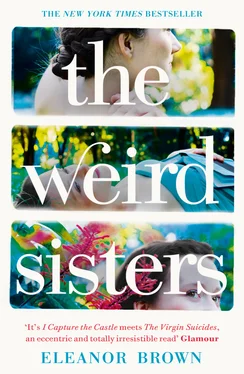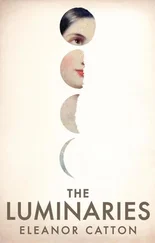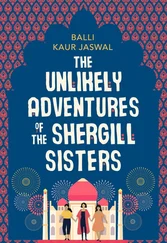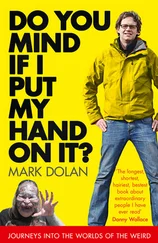1 ...8 9 10 12 13 14 ...18 ‘No one says you have to wear a big white dress. Wear what you want. It’s not going to be a big formal wedding, right? Not black-tie or anything?’
Rose shook her head.
‘Then it doesn’t matter if it’s not traditional.’
‘I guess,’ Rose said, but looked slightly confused by the idea.
They had come to the head of Main Street, and Bean stopped. ‘I’ll look with you. We’ll go to Columbus; there won’t be anything here,’ Bean said. She turned to Rose for a moment and smiled, a sharp-toothed strangeness that was nonetheless kind. ‘You’ll be beautiful,’ she said, and squeezed our older sister’s sweaty palm.
Rose smiled back, a more genuine smile of surprise and pleasure, and came to a stop in front of the post office. ‘Thanks.’ She wanted to say more, but the moment had passed, and it wasn’t in our nature to prolong sentimentality. She felt, for a moment, that she could tell Bean about how betrayed and confused she felt about Jonathan’s departure, how torn she was about what she would do, that somehow Bean would understand, would be able to help. But then she pushed it aside. Bean couldn’t help her with something like that. A dress, Bean could do. A life, no. ‘I’ve got to go in and mail this.’
‘Okay. I’m gonna walk down the street and check things out. I’ll meet you in the Beanery in, like, a half hour?’
‘Sure,’ Rose shrugged and watched Bean walk away, her hair still bouncing back and forth, the creases in her clothes unbeaten by the heat. Rose shook her head and went inside to buy the stamp to mail a letter to Jonathan in Oxford.
The library drew Bean down the street, as it had drawn all of us over the years. Our parents had trained us to become readers, and the town’s library had been the one place, other than church, that we visited every week. When we were young, we had three little red wagons that we would pull into town like a parade each Saturday morning, our mother at the head like the high-stepping grand marshal. Rose liked to go last, to keep an eye on the rest of us, particularly Cordy, who was usually in desperate need of it. Cordy would be eating a Popsicle, letting it drip along her arm, stopping to lick the sticky sweet slug trails off her skin. Or she wouldn’t have stacked her books well and they would fall over the sides of the wagon, Rose picking them up like a flower girl in reverse. Or she would halt, squatting down to stare at an anthill in the cracks of a sidewalk, mesmerized by the to-ings and fro-ings until Rose poked her in the behind and made her waddle on. Bean, who liked to arrive first, would be following our mother, peppering her with questions that she answered when she found the time between social conversations along the way.
The building smelled the same – dusty and damp, and Bean stopped inside the door and inhaled. With all the money the town got from the college, she would have thought they would have changed the library, but it had remained the same. The carpet was dirty marigold, step-worn. To her right was the adult fiction, in the back, by the wall of windows looking out on a spreading willow tree and an ill-tended batch of hedges, the children’s section. A woman browsed in the new fiction shelves, and two children, presumably hers, sat contentedly at the yellow plastic table in the back, studiously examining books too big for their hands. A man sat at one of the battered wooden study carrels, his head bent forward so Bean could see only the curl of his red-touched blond hair over his collar.
Mrs Landrige, the librarian who had been here in the red-wagon days, had been white-haired and stooped even then, but Bean could see her at the desk, stamping library cards with a patient hand. Bean felt a rush of sweet nostalgia for the woman who had introduced us to E. Nesbit and Edward Eager and Laura Ingalls Wilder, and she found herself des perately wanting to give the old woman a hug, not that Mrs Landrige would have trucked with that. Mrs Landrige, as a point of fact, didn’t truck with much.
Bean strode over to the desk and leaned forward, her voice falling immediately to a whisper. We’d been well-trained. ‘Mrs Landrige.’
The old woman’s head popped up, her eyes sharp, watery blue. ‘Bianca!’ she said without a moment’s hesitation. Her recall amazed Bean. With the way professors and their families shifted in and out of this town, she wondered how many patrons this otherwise small-town place would have had, how many cards Mrs Landrige could associate with a face. ‘How lovely to see you!’
‘It’s good to see you, too,’ Bean said honestly. ‘I thought you might have retired.’
Mrs Landrige smiled. ‘I’m too old not to work. Keeps my mind off the inevitable.’ She gave a wheezy little chuckle, the red and black checked bow of her dress trembling against her chest.
Bean didn’t quite know what to say, so she smiled back and cast her eyes around the room again, taking in the desk with the stacks of paper, the eroded rubber stamps leaning drunkenly against one another on the desktop. The children in the back squabbled for a moment about a book in the centre of the table, and the man in the study carrel lifted his head for a moment, giving Bean a flash of his profile – strong cheekbones fading down into a goatee, his hairline crawling back genteelly from his forehead. Bean thought he could have been handsome. Pity about the goatee.
‘Back for a visit?’ Mrs Landrige asked. She had gone back to her careful work, leaving a date in the future stamped, slightly askew, in a column of its relations. ‘Or to stay?’
‘To stay,’ Bean said, and then stammered it back in. ‘I mean – I don’t know how long I’ll be here. I might go back to the city after . . .’ After what, exactly? After our mother dies? After no one wants to throw you in jail any more? When will it be safe, Bean? ‘After a while,’ she finished weakly.
Mrs Landrige stopped, mid-stamp, and rested her weapon on the desk. She peered up at Bean for a moment, considering, and then gave a little nod, as though she’d decided something for herself. ‘Then you’ll need a library card, won’t you?’ she said finally, as though that solved everything (which, in our family, it nearly did). She opened a drawer with one vein-knotted hand and flicked out a stack of cards. She wrote Bean’s name down on one of them in her precise, schoolroom script and handed it over with a flourish. ‘It’s nice to have you back, dear,’ she said, and smiled, and Bean suddenly felt like crying.
She blinked hard and turned her gaze away from Mrs Landrige, lest the urge to cry, or worse, to hug her, returned. The man in the study carrel gathered his things and strode towards the desk. He wore jeans and a Superman T-shirt, and his boots were battered and faded in spots. No wedding ring, about the right age. Worth a hair flip, at least.
‘All ready, Father?’ Mrs Landrige asked, taking the books from the man.
‘As I’ll ever be,’ he said.
‘Have you met Father Aidan?’ the librarian asked Bean, who was busy blushing a little at her idea of flirting with a priest.
‘No,’ Bean said, and thrust out her hand, a little too quickly. ‘I’m Bianca Andreas. My father’s a professor here. At Barnwell,’ she added, as though the town were an academic Gotham, teeming with institutions of higher learning.
He smiled, revealing teeth that were bright white, and slightly crooked, as though his mouth were off-balance in some way. ‘Charmed,’ he said. ‘I’m Aidan.’
‘Father Aidan is the new priest at Saint Mark’s,’ Mrs Landrige advised Bean, neatly closing the last book and pushing the stack across the desk to him.
Well, at least he wasn’t Catholic. St Mark’s was our church – Episcopalian, not so progressive that it would have let our Bean actually bed the man standing in front of her (at least not with any expediency), but she wasn’t going to go to hell just for thinking of it. Episcopalian priests could date, could fall in love, could marry. Maybe they could even engage in some heavy premarital petting. Bean had never really had the opportunity to consider this before.
Читать дальше












